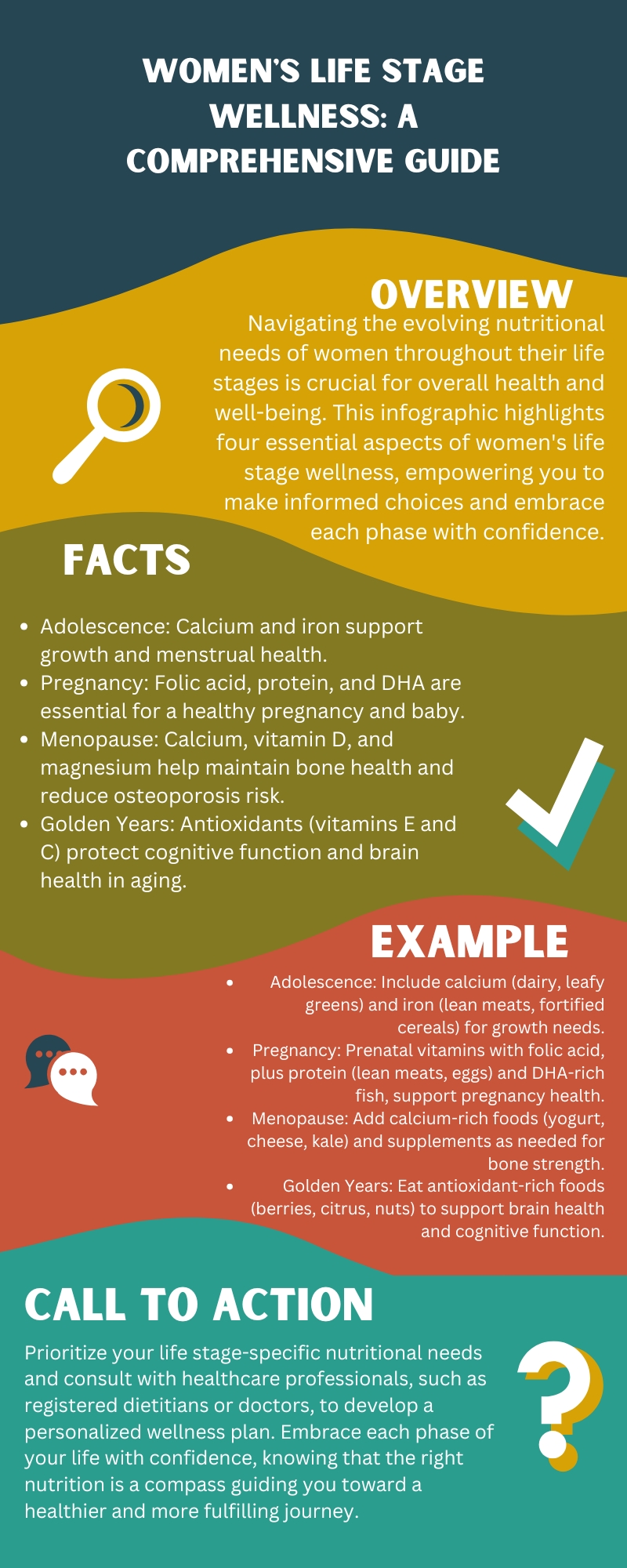Nutrition is often called the foundation of health, and it’s especially important for women. This is because a woman’s nutritional needs shift throughout her life. Understanding and addressing these evolving demands is crucial for overall health and well-being.
This blog article examines the unique nutritional needs of women at different stages of life, empowering them to make informed choices and achieve optimal wellness.
Key Nutrients and Their Benefits
| Nutrient | Benefits |
|---|---|
| Calcium | Supports strong bones and muscle function |
| Iron | Replenishes monthly losses and supports increasing blood volume |
| Magnesium | Helps manage menstrual symptoms and supports muscle function |
| B Vitamins | Convert food into energy and support mental wellness |
| Omega-3 Fatty Acids | Reduce inflammation, improve mood, and support brain health |
| Folic Acid | Reduces the risk of neural tube defects in fetuses |
| Protein | Supports fetal growth, tissue repair, and muscle maintenance |
| Vitamin D | Works with calcium to support bone health |
| Vitamin B12 | Crucial for nerve function |
| Fiber | Supports digestive health |
| Antioxidants (Vitamins E and C) | Protect cognitive function |
Adolescence (Puberty to Late Teens)
1. Physical Development and Nutritional Needs
Adolescence is a time of rapid physical and emotional growth, and nutrition is essential for supporting these changes. One of the most critical nutrients during this period is calcium, which is vital for building strong bones.
As bone density and growth peak during adolescence, sufficient calcium intake is crucial, not just for skeletal development, but for nerve and muscle function as well. Iron is another vital nutrient, especially for girls who have begun menstruating, as it replenishes monthly losses and supports increasing blood volume.
2. Building a Foundation for Healthy Habits
Adolescence is an ideal time to establish healthy eating habits that can last a lifetime. Encouraging teens to understand the importance of nutrition and eating a balanced diet rich in fruits, vegetables, whole grains, and lean protein can positively impact their relationship with food in the future.
This stage is also when issues such as anorexia nervosa can arise, underscoring the need for a proactive approach to nutrition education and support.
3. Hormonal Shifts and Menstrual Health
Puberty brings hormonal changes that can lead to discomfort and irregularities. A diet rich in magnesium, B vitamins, and omega-3 fatty acids can help manage menstrual symptoms. Other issues that commonly arise at this stage include irregular periods, polycystic ovary syndrome, and sexual health problems.

Reproductive Years (Late Teens to Late 40s)
1. Family Planning and Pregnancy
During the reproductive years, many women contemplate motherhood. For those planning a pregnancy, folic acid is essential for the healthy development of the fetus, particularly in reducing the risk of neural tube defects. Incorporating leafy greens, lentils, and fortified grains, which are rich in folic acid, into one’s diet is paramount.
Prenatal vitamins taken at least three months before conception can also help reduce the risk of fetal neural tube defects. Contraception and its potential failures are important considerations during this time.
2. Pregnancy and Postpartum Needs
Pregnancy and lactation bring increased nutritional demands. Protein intake needs a significant boost to support the growth of the fetus and aid in tissue repair after delivery. Maintaining sufficient calcium and iron intake is also crucial to meet the needs of both mother and baby.
DHA, an essential fatty acid, plays a vital role in infant brain development and is therefore an indispensable part of a pregnant woman’s diet. Abnormal uterine bleeding and sexually transmitted diseases are among the health problems that can affect women during this stage.
3. Balancing Roles and Mental Wellness
Juggling the demands of career, family, and personal life can be stressful during the reproductive years. B vitamins, essential for converting food into energy, can help women manage the rigors of daily life.
Magnesium, often called the “relaxation mineral”, supports muscle function and can provide relief from menstrual cramps. Omega-3 fatty acids, found in fatty fish and flaxseeds, are linked to improved mood and a reduced risk of postpartum depression.

Midlife (Late 40s to Early 60s)
1. Perimenopause and Menopause
Menopause, the natural end of a woman’s reproductive years, typically begins in the late 40s to early 50s. During this transition, estrogen and progesterone levels fluctuate and eventually decline, leading to various physical and emotional changes. Common menopausal symptoms include hot flashes, mood swings, sleep disturbances, weight gain, and sexual changes. Hormonal therapy and lifestyle changes can be considered to manage these symptoms.
2. Bone Health and Osteoporosis
A significant concern during menopause is the gradual loss of bone density, increasing the risk of osteoporosis. Consuming adequate amounts of calcium, vitamin D, and magnesium can help mitigate this risk and support strong bones. Good dietary sources of these nutrients include dairy products, green leafy vegetables, and fortified foods.

3. Cardiovascular Health and Weight Management
Postmenopausal women are at an increased risk of cardiovascular disease. Regular aerobic activity is important for maintaining cardiovascular health, flexibility, and posture. Additionally, the metabolic rate slows down during menopause, making weight management a common challenge. Moderating calorie intake, emphasizing protein, and consuming fiber-rich foods can help women maintain a healthy weight and muscle mass.
4. Mental and Emotional Well-being
Midlife is a time of emotional and psychological transitions. Self-care practices and stress reduction techniques are essential for managing these changes. Support systems and therapy can also help navigate this phase. Breast health also becomes a significant concern during midlife. Women should be aware of breast self-exams, clinical breast exams, and mammograms to ensure early detection and promote breast health.

The Golden Years (65+)
1. Cognitive Function and Brain Health
As women enter their golden years, the focus shifts toward preserving health and enhancing the quality of life. Cognitive health is a priority, and antioxidants, like vitamins E and C, play a crucial role in protecting the brain from oxidative stress and potential decline. Including foods rich in these vitamins, such as nuts, seeds, citrus fruits, and berries, in the diet can be beneficial.
2. Maintaining Muscle Mass and Strength
Aging is associated with a gradual decline in muscle mass and strength. Consuming enough protein is vital for maintaining muscle tone and supporting metabolic functions. Lean meats, fish, beans, and dairy products are good sources of protein.
As the body’s ability to absorb vitamin B12, which is essential for nerve function, often decreases with age, monitoring B12 levels and considering fortified foods or supplements may be necessary.

3. Joint Health and Mobility
Maintaining joint health and mobility is crucial for staying active in the golden years. Omega-3 fatty acids, known for their anti-inflammatory properties, can help alleviate joint pain and stiffness. Maintaining a healthy weight is also important for reducing stress on joints.
4. Hydration and Digestive Health
Staying hydrated is essential at any age, but it becomes even more critical in the golden years as the sense of thirst often diminishes. Consciously consuming water throughout the day is essential for supporting overall bodily functions. Adequate fiber intake can support digestion, which may become sluggish with age.
Conclusion
Nutritional needs vary greatly from person to person. Listening to your body and adjusting your nutritional strategy accordingly is essential for achieving optimal well-being. Consulting with healthcare professionals, such as registered dietitians or doctors, can provide personalized guidance.
Every stage of a woman’s life presents unique challenges and joys. By prioritizing nutrition, exercise, and self-care, women can embrace each phase with confidence and vitality.
Remember that the right nutrition is not merely about sustenance; it’s a compass guiding you toward a healthier and more fulfilling life.
FAQs
- What are the most important nutrients for women during adolescence?
During adolescence, two of the most critical nutrients for women are calcium and iron. Calcium is essential for building strong bones and supporting physical growth, while iron helps replenish monthly losses and supports increasing blood volume, especially important for girls who have begun menstruating. Ensuring adequate intake of these nutrients during this rapid development stage can lay the foundation for lifelong health and wellness. - How can women support their bone health during menopause?
As women transition into menopause, they face an increased risk of osteoporosis due to the gradual loss of bone density. Consuming sufficient amounts of calcium, vitamin D, and magnesium can help mitigate this risk and support strong bones. Good dietary sources include dairy products, leafy greens, and fortified foods. Regular weight-bearing exercise can also play a crucial role in maintaining bone health during this life stage. - What are some strategies for managing weight during the menopausal transition?
The menopausal transition often brings about a slowing of the metabolic rate, making weight management a common challenge for women. Strategies to help maintain a healthy weight include moderating calorie intake, emphasizing protein-rich foods, and consuming fiber-rich foods to promote satiety. Incorporating regular aerobic activity can also be beneficial for maintaining cardiovascular health and supporting a healthy metabolism. - How can women support their cognitive function as they age?
As women enter their golden years, preserving cognitive health becomes a top priority. Incorporating antioxidant-rich foods, such as nuts, seeds, citrus fruits, and berries, can help protect the brain from oxidative stress and potential decline. Maintaining an active lifestyle, engaging in mentally stimulating activities, and staying socially connected are also important for supporting cognitive function and overall brain health.



